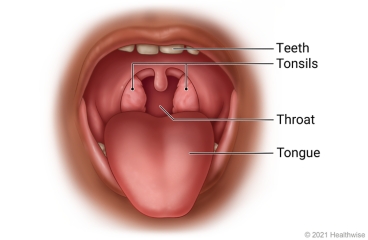
Overview
Infection by bacteria or a virus causes most sore throats. Cigarette smoke, dry air, air pollution, allergies, or yelling also can cause a sore throat. Sore throats can be painful and annoying. Fortunately, most sore throats go away on their own.
Home treatment may help your child feel better sooner. Antibiotics are not needed unless your child has a strep infection.
Follow-up care is a key part of your child's treatment and safety. Be sure to make and go to all appointments, and call your doctor if your child is having problems. It's also a good idea to know your child's test results and keep a list of the medicines your child takes.
How can you care for your child at home?
- If the doctor prescribed antibiotics for your child, give them as directed. Do not stop using them just because your child feels better. Your child needs to take the full course of antibiotics.
- Have your child gargle with warm salt water several times a day to help reduce swelling and relieve pain. Mix 1/2 teaspoon of salt in 1 cup of warm water. Most children can gargle when they are 6 years old.
- Give acetaminophen (Tylenol) or ibuprofen (Advil, Motrin) for pain. Do not use ibuprofen if your child is less than 6 months old unless the doctor gave you instructions to use it. Be safe with medicines. Read and follow all instructions on the label. Do not give aspirin to anyone younger than 20. It has been linked to Reye syndrome, a serious illness.
- Children over 6 years old can try sucking on lollipops or hard candy.
- Have your child drink plenty of fluids. Drinks such as warm water or warm soup may ease throat pain. Cold foods like Popsicles and ice cream can soothe the throat.
- Keep your child away from smoke. Do not smoke or let anyone else smoke around your child or in your house. Smoke irritates the throat.
- Place a cool-mist humidifier by your child's bed or close to your child. This may make it easier for your child to breathe. Follow the directions for cleaning the machine.
When should you call for help?
Call 911 anytime you think your child may need emergency care. For example, call if:
- Your child is confused, does not know where they are, or is extremely sleepy or hard to wake up.
Call your doctor now or seek immediate medical care if:
- Your child has a new or higher fever.
- Your child has a fever with a stiff neck or a severe headache.
- Your child has any trouble breathing.
- Your child cannot swallow or cannot drink enough because of throat pain.
- Your child coughs up discolored or bloody mucus.
Watch closely for changes in your child's health, and be sure to contact your doctor if:
- Your child has any new symptoms, such as a rash, an earache, vomiting, or nausea.
- Your child is not getting better as expected.
Where can you learn more?
Go to http://www.healthwise.net/patientEd
Enter V819 in the search box to learn more about "Sore Throat in Children: Care Instructions".
Current as of: September 27, 2023
Author: Ignite Healthwise, LLC Staff
Clinical Review Board
All Healthwise education is reviewed by a team that includes physicians, nurses, advanced practitioners, registered dieticians, and other healthcare professionals.

